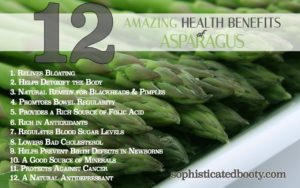Why? Here are some reasons asparagus is a health topic for May!
1- Asparagus is a low-calorie vegetable that is an excellent source of essential vitamins and minerals, especially folate and vitamins A, C and K.
2- Asparagus is a good source of antioxidants!
3- Antioxidants are compounds that help protect your cells from the harmful effects of free radicals and oxidative stress.
Oxidative stress contributes to aging, chronic inflammation and many diseases, including cancer.
Asparagus, like other green vegetables, is high in antioxidants. These include vitamin E, vitamin C and glutathione, as well as various flavonoids and polyphenols.
Asparagus is particularly high in the flavonoids quercetin, isorhamnetin and kaempferol. These substances have been found to have blood pressure-lowering, anti-inflammatory, antiviral and anticancer effects in a number of human, test-tube and animal studies.
Purple asparagus contains powerful pigments called anthocyanins, which give the vegetable its vibrant color and have antioxidant effects in the body. This increasing anthocyanin intake has been shown to reduce blood pressure and the risk of heart attacks and heart disease. So eating asparagus along with other fruits and vegetables can provide your body with a range of antioxidants to promote good health.
4- Dietary fiber is essential for good digestive health.
Taking a half a cup of asparagus contains 1.8 grams of fiber, which is 7% of your daily needs.
Studies suggest that a diet high in fiber-rich fruits and vegetables may help reduce the risk of high blood pressure, heart disease and diabetes!
Asparagus is particularly high in insoluble fiber, which adds bulk to stool and supports regular bowel movements.
It also contains a small amount of soluble fiber, which dissolves in water and forms a gel-like substance in the digestive tract. Soluble fiber feeds the friendly bacteria in the gut. Examples of friendly bacteria like Bifidobacteria and Lactobacillus. Increasing the number of these beneficial bacteria plays a role in strengthening the immune system and producing essential nutrients like vitamins B12 and K2. Eating asparagus as part of a fiber-rich diet is an excellent way to help meet your fiber needs and keep your digestive system healthy.
Endling line asparagus helps your digestive system by promoting regularity, digestive health and may aid in reducing your risk of heart disease, high blood pressure and diabetes.
5- It helps to support a healthy pregnancy! How? Asparagus is an excellent source of folate, also known as vitamin B9. Just half a cup of asparagus provides adults with 34% of their daily folate needs and pregnant women with 22% of their daily needs. Getting enough folate from sources like asparagus, green leafy vegetables and fruit can protect against neural tube defects, including spina bifida (both happening during fetal developement). Folate is so vital during pre-pregnancy and early pregnancy that folate supplements are recommended to ensure women meet their requirements. Folate is an essential nutrient that helps form red blood cells and produce DNA for healthy growth and development. It’s especially important during the early stages of pregnancy to ensure the healthy development of the baby.
6- It helps lower the blood pressure! High blood pressure affects more than 1.3 billion people worldwide and is a major risk factor for heart disease and stroke. Research suggests that increasing potassium intake while reducing salt intake is an effective way to lower high blood pressure. Potassium lowers blood pressure in two ways: by relaxing the walls of blood vessels and excreting excess salt through urine.
Asparagus is a good source of potassium, providing 6% of your daily requirement in a half-cup serving.
What’s more, research in rats with high blood pressure suggests that asparagus may have other blood pressure-lowering properties. In one study, rats were fed either a diet with 5% asparagus or a standard diet without asparagus.
After 10 weeks, the rats on the asparagus diet had 17% lower blood pressure than the rats on the standard diet.
Ending line, eating more potassium-rich vegetables, such as asparagus, is a great way to help keep your blood pressure in a healthy range.
7- It can help if your dieting to lose weight. How? First asparagus is about 94% water. Research suggests that consuming low-calorie, water-rich foods is associated with weight loss. It can definitely help in dieting!
8- It’s inexpensive!

